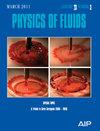马赫数对湍流边界层下壁压波动时空特征的影响
IF 4.3
2区 工程技术
Q1 MECHANICS
引用次数: 0
摘要
湍流边界层下的壁压波动是通过激发壁面结构而产生气动噪声的基本来源,其时空特性是预测壁面结构响应的基本要素。为此,我们对马赫数为 0.5、1.2 和 2.0 的完全可压缩湍流边界层进行了直接数值模拟,以全面研究壁面压力波动。结果表明,马赫数对壁面压力波动的单点统计量,如均方根、偏度和平坦度系数、概率密度函数和频谱的影响非常微弱。在时空特性方面,壁面压力波动的时空相关性所确定的对流速度 Uc 随马赫数的增加而略有增加,这仅反映了湍流涡旋的对流行为。在波数-频谱上,可以发现声波和对流涡旋的特征峰。在马赫数为 0.5 时,快速声波(Uc+c)和慢速声波(Uc-c)的峰值与其他峰值不相连,c 表示声速,而在马赫数为 1.2 和 2.0 时,只有快速声波的峰值能与对流峰值区分开来。由于超音速条件下的气动加热,在确定声波波长时应考虑热效应对声速的影响。通过引入对流普朗特-格劳尔特参数,我们提出了一种改进的关系,以更准确地描述波数-频谱中的声域。本文章由计算机程序翻译,如有差异,请以英文原文为准。
Effects of Mach number on space-time characteristics of wall pressure fluctuations beneath turbulent boundary layers
Wall pressure fluctuations beneath turbulent boundary layers are a fundamental source of aerodynamic noise by exciting the wall structure, with their space-time characteristics serving as the basic ingredient for predicting the wall structural response. To this end, direct numerical simulations of fully developed compressible turbulent boundary layers at Mach numbers of 0.5, 1.2, and 2.0 are conducted to investigate wall pressure fluctuations comprehensively. The effects of Mach number on the single-point statistics of wall pressure fluctuations, such as the root mean square, skewness and flatness factors, probability density function, and frequency spectrum, are assessed to be very weak. Regarding the space-time characteristics, the convection velocity Uc determined by the space-time correlation of wall pressure fluctuations increases slightly with the Mach number, which only reflects the convective behavior of turbulent vortices. On the wavenumber–frequency spectrum, characteristic peaks of both the acoustic wave and convective vortices are identified. At Mach 0.5, the peaks of the fast (Uc+c) and slow (Uc−c) acoustic waves are unattached to others with c denoting acoustic speed, while only the peak of the fast acoustic wave is distinguishable from the convective peak at Mach 1.2 and 2.0. Due to the aerodynamic heating at supersonic conditions, the thermal effect on acoustic speed should be taken into account in determining the acoustic wavenumber. By introducing a convective Prandtl–Glauert parameter, a refined relation is proposed to provide a more accurate depiction of the acoustic domain in the wavenumber–frequency spectrum.
求助全文
通过发布文献求助,成功后即可免费获取论文全文。
去求助
来源期刊

Physics of Fluids
物理-力学
CiteScore
6.50
自引率
41.30%
发文量
2063
审稿时长
2.6 months
期刊介绍:
Physics of Fluids (PoF) is a preeminent journal devoted to publishing original theoretical, computational, and experimental contributions to the understanding of the dynamics of gases, liquids, and complex or multiphase fluids. Topics published in PoF are diverse and reflect the most important subjects in fluid dynamics, including, but not limited to:
-Acoustics
-Aerospace and aeronautical flow
-Astrophysical flow
-Biofluid mechanics
-Cavitation and cavitating flows
-Combustion flows
-Complex fluids
-Compressible flow
-Computational fluid dynamics
-Contact lines
-Continuum mechanics
-Convection
-Cryogenic flow
-Droplets
-Electrical and magnetic effects in fluid flow
-Foam, bubble, and film mechanics
-Flow control
-Flow instability and transition
-Flow orientation and anisotropy
-Flows with other transport phenomena
-Flows with complex boundary conditions
-Flow visualization
-Fluid mechanics
-Fluid physical properties
-Fluid–structure interactions
-Free surface flows
-Geophysical flow
-Interfacial flow
-Knudsen flow
-Laminar flow
-Liquid crystals
-Mathematics of fluids
-Micro- and nanofluid mechanics
-Mixing
-Molecular theory
-Nanofluidics
-Particulate, multiphase, and granular flow
-Processing flows
-Relativistic fluid mechanics
-Rotating flows
-Shock wave phenomena
-Soft matter
-Stratified flows
-Supercritical fluids
-Superfluidity
-Thermodynamics of flow systems
-Transonic flow
-Turbulent flow
-Viscous and non-Newtonian flow
-Viscoelasticity
-Vortex dynamics
-Waves
 求助内容:
求助内容: 应助结果提醒方式:
应助结果提醒方式:


